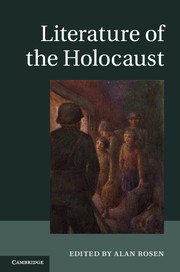Introduction
Published online by Cambridge University Press: 05 June 2014
Summary
As with most world literature, Holocaust literature has regularly invoked imagery of the heavenly bodies: the sun, the moon, and especially the stars. “Our eyes register the light of dead stars,” begins André Schwarz-Bart’s formidable 1959 Holocaust novel, The Last of the Just. Premised on the laws of light and optics, this opening sentence sets forth the novel’s memorial mandate: to bring before the reader’s (and narrator’s?) eyes the light that continues to radiate from the Holocaust’s no longer living victims.
But stars have also held a special attraction for Holocaust literature because of the insignia, the Star of David, that Jews were forced to wear in order to set them apart from the general population. “Today two harsh decrees reached us. First, the Star of David decree,” writes Warsaw diarist Chaim Kaplan on November 30, 1939. Like many, Kaplan turned the decree inside out: with the prospect of the ‘Star of David’ insignia soon to be affixed not only to clothing but to Jewish businesses, he conjectures that “everywhere we turn we shall feel as if we were in a Jewish kingdom.” Strikingly, Kaplan concludes the star-burdened entry by pondering the role of the Jewish poet in a time of catastrophe: “A poet who clothes adversity in poetic form immortalizes it in an ever lasting monument.” The Cambridge Literature of the Holocaust aims to pick up where Kaplan’s meditation left off, surveying how, during the war and in its aftermath, writers – some of whom were gifted poets, some journeyman diarists like Kaplan, and some merely children – clothed the ever-intensifying adversity in a stunning variety of literary forms.
- Type
- Chapter
- Information
- Literature of the Holocaust , pp. 1 - 12Publisher: Cambridge University PressPrint publication year: 2013



